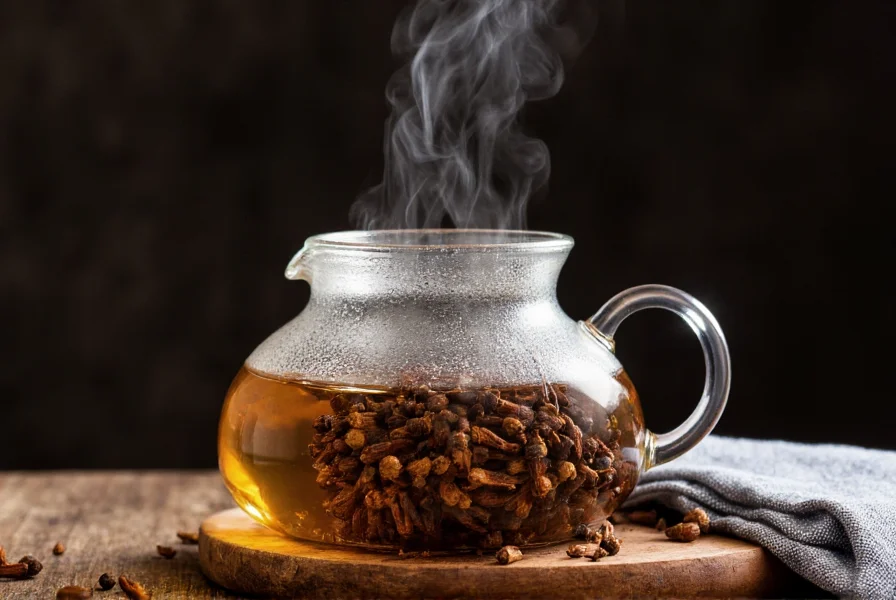Why People Seek Clove Tea (And Common Misconceptions)
If you're searching for natural sore throat remedies or digestive aids, clove tea seems appealing. But popular claims often overstate its benefits. While cloves contain eugenol—a compound with antioxidant properties noted by WebMD—it's not a cure-all. Most scientific studies focus on clove extracts, not tea. Crucially, Herbpy confirms cloves are unsafe during pregnancy due to uterine stimulation risks. This isn't a DIY solution for serious conditions.

When Clove Tea Helps (And When It Backfires)
Using clove tea effectively requires understanding its narrow safety window. Eugenol—the active compound—can soothe minor throat irritation at culinary doses but becomes toxic above 5,000 mg daily (WebMD). Below is a decision guide based on medical guidelines:
| Scenario | Recommended? | Key Reason |
|---|---|---|
| Mild sore throat (adults) | Yes (short-term) | Eugenol may temporarily numb pain; max 1 cup/day (WebMD) |
| Pregnancy or breastfeeding | Avoid | Linked to uterine contractions (Herbpy safety review) |
| Taking anticoagulants | Avoid | Eugenol may increase bleeding risk (WebMD) |
| Children under 6 | Avoid | No safety data; choking hazard from whole cloves |
Safe Preparation: No Guesswork Needed
Forget viral "boil cloves for 20 minutes" hacks. Over-extraction increases eugenol concentration, raising toxicity risks. Follow this evidence-based method:
- Measure precisely: Use 1/2–1 teaspoon of whole cloves per cup (never powder—it’s harder to control dosage).
- Heat water to boiling: Pour over cloves in a teapot. Do not simmer—boiling degrades compounds.
- Steep 5–10 minutes: Longer steeping = higher eugenol levels. Set a timer.
- Strain immediately: Prevents over-extraction. Discard cloves—reusing increases potency.
- Limit consumption: Max 1 cup daily for adults. Add honey only after cooling to preserve benefits.

Avoid These 3 Critical Mistakes
- Mistake: Using clove oil instead of whole cloves. Why: Oil contains concentrated eugenol (up to 90%)—WebMD warns even small doses can cause seizures.
- Mistake: Daily long-term use. Why: Chronic exposure links to liver damage in case studies (WebMD).
- Mistake: Ignoring quality. Why: Stale cloves lose potency. Check for dark brown color and strong aroma—dull cloves indicate age.
Final Recommendation: Safety First
Clove tea has limited, short-term uses for adults. Never replace medical treatment for infections or chronic pain. If symptoms persist beyond 48 hours, consult a doctor. For most users, ginger or chamomile tea offers safer daily options with better-studied benefits. Always prioritize verified health guidance over anecdotal claims.
Everything You Need to Know
No. Clove tea may provide temporary numbing relief from sore throats due to eugenol’s topical effect, but it doesn’t treat infections. WebMD states there’s insufficient evidence for clove tea as a therapeutic remedy. See a doctor for persistent symptoms.
Limit to 1 cup (240ml) daily using 1/2–1 teaspoon of whole cloves. Exceeding this raises eugenol toxicity risks, potentially causing liver damage or nausea (WebMD). Never consume clove oil—its concentration is unsafe for ingestion.
No. Reusing cloves increases eugenol concentration with each steep, risking overdose. Discard cloves after one use. Whole cloves should be dark brown and aromatic—discard if faded, as potency degrades over time.
No. Herbpy’s review of clinical data confirms cloves may stimulate uterine contractions. Avoid entirely during pregnancy and breastfeeding. Safer alternatives include lemon-honey water for sore throats.
Keep in an airtight container away from light and heat. Properly stored cloves last 1–2 years. Check for strong aroma and deep color—dull cloves indicate age and reduced potency. Never refrigerate, as moisture degrades quality.









 浙公网安备
33010002000092号
浙公网安备
33010002000092号 浙B2-20120091-4
浙B2-20120091-4